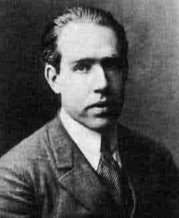Niels Bohr
Bohr, Niels Henrik David
| Topics: |
Niels Henrik David Bohr (1885-1962), a Danish physicist who identified the fundamental structure of atoms and quantum mechanics. Building on the earlier theory of Ernest Rutherford, Bohr proposed that electrons travel only in certain successively larger orbits. He argued that the outer orbits could hold more electrons than the inner ones, and that these outer orbits determine the atom's chemical properties. Bohr also described the way atoms emit radiation, by suggesting that electrons emit light when jumping from an outer orbit to an inner one. Other physicists later expanded his theory into quantum mechanics, a foundation for modern physics. During the Nazi occupation of Denmark, Bohr escaped and eventually worked on the Atomic Energy Project in England and the U.S. during World War II. He later advocated the peaceful application of atomic physics. Bohr was awarded the Nobel Prize in Physics 1922.
Further Reading
Niels Bohr(Nobel Prize Biographies)
Niels Bohr Archive (NBI: Niels Borhr Institute)
A Science Odyssey: People and Discoveries (PBS)
